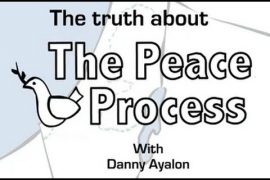The Labour Party’s reluctant acceptance of the IHRA Working Definition of antisemitism in 2018 didn’t occur without a fight. There was one notable dissenter to the proposal to adopt, in full, the IHRA definition: Jeremy Corbyn, who claimed that it would stifle criticism of Israel.
As we noted at the time, the Guardian shared Corbyn’s dishonest interpretation of IHRA, in the following sentences of an official editorial:
The Palestinian narrative of dispossession and expulsion could be stifled, if not outlawed, by interpretations of the IHRA. Punishing political speech would stir more discord. If Jews have a right to define what oppresses them then Palestinians should also have the same right.
They’re at it again.
The Guardian, which recently endorsed Corbyn for prime minister, published an article by US correspondent Ed Pilkington (“Trump signs antisemitism order amid concerns it targets critics of Israel”, Dec. 12) that includes a lie in the strap line, which reads:
Measure lets US penalise colleges seen as tolerating antisemitism by allowing criticism of Israel
The executive order signed by Trump merely requires the Education Department to take the IHRA definition into account when determining if a Jewish university student has been discriminated against, in the context of Title VI of the US Civil Rights Act of 1964. And, as we’ve noted repeatedly, the IHRA definition is clear about this, when it stresses that “criticism of Israel similar to that leveled against any other country cannot be regarded as antisemitic“.
The only Israel related commentary defined IHRA as antisemitic is rhetoric which calls for Israel’s destruction, or suggests that, by nature of the fact that it’s entire existence is a racist endeavor, has no right to exist. Strangely, Pilkington, later in the article, cites the specific Israel-related components of IHRA, which, as we’ve show, contradicts his earlier suggestion that IHRA defines mere “criticism of Israel” as antisemitic.)
The lie is repeated in the opening sentence:
Donald Trump has signed an executive order that empowers the US education department to penalise college campuses by withholding federal funds from those that are deemed to be tolerating antisemitism by allowing debate critical of Israel.
It’s important to note that the IHRA definition further clarifies that “applying double standards by requiring of [Israel] a behavior not expected or demanded of any other democratic nation” can be antisemitic. And, afterall, applying double standards to one racial, ethnic or religious group – holding them accountable to moral standards that no other group is held to – is the dictionary definition of bigotry.
The lie is again repeated when Pilkington uncritically quotes the director of Palestine Legal:
But Palestinian and progressive groups decried the executive order as a blatant effort to squash criticism of human rights abuses committed by the state of Israel. Dima Khalidi, director of Palestine Legal, denounced the order as a “baldfaced attempt to silence the movement for Palestinian rights on college campuses”.
He added: “Defining antisemitism to include criticism of Israel serves only to violate the free speech of students and professors who stand for equality and justice for all people.”
Pilkington then engages in more deceit in characterising opposition to BDS a value only shared by “right-wing Republicans”.
Rightwing Republicans have long agitated to quell the rise of the pro-Palestinian boycott movement, known as boycott, divestment and sanctions (BDS) on US campuses. The Guardian revealed in October how conservative activists were working to spread new laws across Republican-controlled states that would ban criticism of Israel in the name of combatting antisemitism.
First, Jewish opposition to BDS is extremely strong, with 82%, according to a poll by American Jewish Committee, describing the movement as either mostly or somewhat antisemitic. Further, a recent poll from Rasmussen found that 20% of likely American voters support BDS.
Additionally, contrary to the Guardian’s claim, activists are not working to “ban criticism of Israel”.
The laws he’s referring to, which have been enacted in both Democratic and Republican-controlled states, narrowly ban state governments from entering into contracts with vendors who participate in BDS, similar to state laws which prevent contacts with vendors who discriminate against the LGBT community. It’s important to note again that such laws only apply to state contracts, and do not in any way prevent individuals from advocating for BDS.
This is far, far different than the Guardian journalist’s supremely dishonest claim that the laws would “ban criticism of Israel”.
Perhaps the real reason the Guardian wants to discredit and mischaracterise the IHRA definition is because they wish to remain free to assert that “Zionism is racism” and that “Israel has no right to exist” with moral impunity – a fact which explains why the overwhelming majority of British Jews will continue to see the news organisation as institutionally “hostile” to their community.





